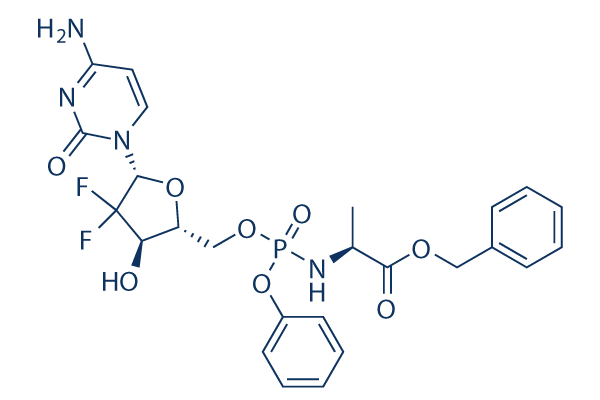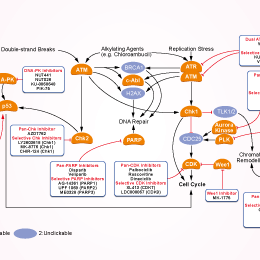
- Bioactive Compounds
- By Signaling Pathways
- PI3K/Akt/mTOR
- Epigenetics
- Methylation
- Immunology & Inflammation
- Protein Tyrosine Kinase
- Angiogenesis
- Apoptosis
- Autophagy
- ER stress & UPR
- JAK/STAT
- MAPK
- Cytoskeletal Signaling
- Cell Cycle
- TGF-beta/Smad
- DNA Damage/DNA Repair
- Compound Libraries
- Popular Compound Libraries
- Customize Library
- Clinical and FDA-approved Related
- Bioactive Compound Libraries
- Inhibitor Related
- Natural Product Related
- Metabolism Related
- Cell Death Related
- By Signaling Pathway
- By Disease
- Anti-infection and Antiviral Related
- Neuronal and Immunology Related
- Fragment and Covalent Related
- FDA-approved Drug Library
- FDA-approved & Passed Phase I Drug Library
- Preclinical/Clinical Compound Library
- Bioactive Compound Library-I
- Bioactive Compound Library-Ⅱ
- Kinase Inhibitor Library
- Express-Pick Library
- Natural Product Library
- Human Endogenous Metabolite Compound Library
- Alkaloid Compound LibraryNew
- Angiogenesis Related compound Library
- Anti-Aging Compound Library
- Anti-alzheimer Disease Compound Library
- Antibiotics compound Library
- Anti-cancer Compound Library
- Anti-cancer Compound Library-Ⅱ
- Anti-cancer Metabolism Compound Library
- Anti-Cardiovascular Disease Compound Library
- Anti-diabetic Compound Library
- Anti-infection Compound Library
- Antioxidant Compound Library
- Anti-parasitic Compound Library
- Antiviral Compound Library
- Apoptosis Compound Library
- Autophagy Compound Library
- Calcium Channel Blocker LibraryNew
- Cambridge Cancer Compound Library
- Carbohydrate Metabolism Compound LibraryNew
- Cell Cycle compound library
- CNS-Penetrant Compound Library
- Covalent Inhibitor Library
- Cytokine Inhibitor LibraryNew
- Cytoskeletal Signaling Pathway Compound Library
- DNA Damage/DNA Repair compound Library
- Drug-like Compound Library
- Endoplasmic Reticulum Stress Compound Library
- Epigenetics Compound Library
- Exosome Secretion Related Compound LibraryNew
- FDA-approved Anticancer Drug LibraryNew
- Ferroptosis Compound Library
- Flavonoid Compound Library
- Fragment Library
- Glutamine Metabolism Compound Library
- Glycolysis Compound Library
- GPCR Compound Library
- Gut Microbial Metabolite Library
- HIF-1 Signaling Pathway Compound Library
- Highly Selective Inhibitor Library
- Histone modification compound library
- HTS Library for Drug Discovery
- Human Hormone Related Compound LibraryNew
- Human Transcription Factor Compound LibraryNew
- Immunology/Inflammation Compound Library
- Inhibitor Library
- Ion Channel Ligand Library
- JAK/STAT compound library
- Lipid Metabolism Compound LibraryNew
- Macrocyclic Compound Library
- MAPK Inhibitor Library
- Medicine Food Homology Compound Library
- Metabolism Compound Library
- Methylation Compound Library
- Mouse Metabolite Compound LibraryNew
- Natural Organic Compound Library
- Neuronal Signaling Compound Library
- NF-κB Signaling Compound Library
- Nucleoside Analogue Library
- Obesity Compound Library
- Oxidative Stress Compound LibraryNew
- Plant Extract Library
- Phenotypic Screening Library
- PI3K/Akt Inhibitor Library
- Protease Inhibitor Library
- Protein-protein Interaction Inhibitor Library
- Pyroptosis Compound Library
- Small Molecule Immuno-Oncology Compound Library
- Mitochondria-Targeted Compound LibraryNew
- Stem Cell Differentiation Compound LibraryNew
- Stem Cell Signaling Compound Library
- Natural Phenol Compound LibraryNew
- Natural Terpenoid Compound LibraryNew
- TGF-beta/Smad compound library
- Traditional Chinese Medicine Library
- Tyrosine Kinase Inhibitor Library
- Ubiquitination Compound Library
-
Cherry Picking
You can personalize your library with chemicals from within Selleck's inventory. Build the right library for your research endeavors by choosing from compounds in all of our available libraries.
Please contact us at [email protected] to customize your library.
You could select:
- Antibodies
- Bioreagents
- qPCR
- 2x SYBR Green qPCR Master Mix
- 2x SYBR Green qPCR Master Mix(Low ROX)
- 2x SYBR Green qPCR Master Mix(High ROX)
- Protein Assay
- Protein A/G Magnetic Beads for IP
- Anti-Flag magnetic beads
- Anti-Flag Affinity Gel
- Anti-Myc magnetic beads
- Anti-HA magnetic beads
- Magnetic Separator
- Poly DYKDDDDK Tag Peptide lyophilized powder
- Protease Inhibitor Cocktail
- Protease Inhibitor Cocktail (EDTA-Free, 100X in DMSO)
- Phosphatase Inhibitor Cocktail (2 Tubes, 100X)
- Cell Biology
- Cell Counting Kit-8 (CCK-8)
- Animal Experiment
- Mouse Direct PCR Kit (For Genotyping)
- New Products
- Contact Us
Acelarin (NUC-1031)
Synonyms: CPF-31, MTL-007, GTPL7389
Acelarin (NUC-1031, CPF-31, MTL-007, GTPL7389) is a DNA synthesis inhibitor with EC50 of 0.2 nM.

Acelarin (NUC-1031) Chemical Structure
CAS No. 840506-29-8
Purity & Quality Control
Acelarin (NUC-1031) Related Products
| Related Targets | tRNA synthetase RdRp DNA synthesis helicase ribonucleotide reductase | Click to Expand |
|---|---|---|
| Related Products | Pidnarulex (CX-5461) SCR7 Favipiravir (T-705) RK-33 Carmofur Triapine (3-AP) B02 BMH-21 YK-4-279 Bergapten Tegafur (FT-207) Azaguanine-8 Halofuginone Adenine HCl Mizoribine Cyclocytidine HCl Thymidine APX-3330 Nedaplatin 6-Thio-dG Flupirtine maleate JH-RE-06 Pritelivir (BAY 57-1293) TK216 Amenamevir Madrasin Tubercidin BC-LI-0186 CRT0044876 PFM01 Adenine ML216 | Click to Expand |
| Related Compound Libraries | FDA-approved Drug Library Natural Product Library Apoptosis Compound Library DNA Damage/DNA Repair compound Library Cell Cycle compound library | Click to Expand |
Signaling Pathway
Biological Activity
| Description | Acelarin (NUC-1031, CPF-31, MTL-007, GTPL7389) is a DNA synthesis inhibitor with EC50 of 0.2 nM. | ||
|---|---|---|---|
| Targets |
|
| In vitro | ||||
| In vitro | NUC-1031 is a prodrug with potent cytostatic activity in a range of different tumor cell lines. Importantly, NUC-1031 activation is significantly less dependent on deoxycytidine kinase and on nucleoside transporters, and it is resistant to cytidine deaminase-mediated degradation.[1] |
|||
|---|---|---|---|---|
| Cell Research | Cell lines | Murine leukemia L1210, human lymphocyte CEM | ||
| Concentrations | 1 μM | |||
| Incubation Time | 1 h | |||
| Method | Metabolic Stability (Cryopreserved Hepatocytes, Human) Assay. The assay is contracted and performed by Cerep according to the published procedure.Pooled cryopreserved hepatocytes are thawed, washed, and resuspended in Krebs-Heinslet buffer (pH 7.3). The reaction is initiated by adding Acelarin (NUC-1031) (1 μM final concentration) into cell suspension and incubated in a final volume of 100 μL on a flatbottom 96-well plate for 0 and 60 min, respectively, at 37 ℃/5% CO2. The reaction is stopped by adding 100 μL of acetonitrile into the incubation mixture. Samples are then mixed gently and briefly on a plate shaker, transferred completely to a 0.8 mL V-bottom 96-well plate, and centrifuged at 2550 × g for 15 min at room temperature. Each supernatant (150 μL) is transferred to a clean cluster tube, followed by HPLC-MS/MS analysis on a Thermo Electron triplequadrupole system. |
|||
| In Vivo | ||
| In vivo | NUC-1031 shows a significant reduction in tumor volumes in vivo in pancreatic cancer xenografts.[1] |
|
|---|---|---|
| Animal Research | Animal Models | MiaPaCa-2 bearing nude mice, BxPC-3 bearing nude mice |
| Dosages | 0.19 mM/kg, 0.076 mM/kg | |
| Administration | IP | |
| NCT Number | Recruitment | Conditions | Sponsor/Collaborators | Start Date | Phases |
|---|---|---|---|---|---|
| NCT02351765 | Completed | Biliary Tract Cancer|Gallbladder Cancer|Cholangiocarcinoma|Ampullary Cancer |
The Christie NHS Foundation Trust |
January 2016 | Phase 1 |
| NCT02303912 | Completed | Recurrent Ovarian Cancer |
Imperial College Healthcare NHS Trust |
November 2014 | Phase 1 |
| NCT01621854 | Completed | Cancer |
Imperial College London|Nucana |
October 2012 | Phase 1 |
Chemical Information & Solubility
| Molecular Weight | 580.47 | Formula | C25H27F2N4O8P |
| CAS No. | 840506-29-8 | SDF | -- |
| Smiles | CC(C(=O)OCC1=CC=CC=C1)NP(=O)(OCC2C(C(C(O2)N3C=CC(=NC3=O)N)(F)F)O)OC4=CC=CC=C4 | ||
| Storage (From the date of receipt) | 3 years -20°C powder | ||
|
In vitro |
DMSO : 100 mg/mL ( (172.27 mM) Moisture-absorbing DMSO reduces solubility. Please use fresh DMSO.) Ethanol : 20 mg/mL Water : Insoluble |
Molecular Weight Calculator |
|
In vivo Add solvents to the product individually and in order. |
In vivo Formulation Calculator |
||||
Preparing Stock Solutions
Molarity Calculator
In vivo Formulation Calculator (Clear solution)
Step 1: Enter information below (Recommended: An additional animal making an allowance for loss during the experiment)
mg/kg
g
μL
Step 2: Enter the in vivo formulation (This is only the calculator, not formulation. Please contact us first if there is no in vivo formulation at the solubility Section.)
% DMSO
%
% Tween 80
% ddH2O
%DMSO
%
Calculation results:
Working concentration: mg/ml;
Method for preparing DMSO master liquid: mg drug pre-dissolved in μL DMSO ( Master liquid concentration mg/mL, Please contact us first if the concentration exceeds the DMSO solubility of the batch of drug. )
Method for preparing in vivo formulation: Take μL DMSO master liquid, next addμL PEG300, mix and clarify, next addμL Tween 80, mix and clarify, next add μL ddH2O, mix and clarify.
Method for preparing in vivo formulation: Take μL DMSO master liquid, next add μL Corn oil, mix and clarify.
Note: 1. Please make sure the liquid is clear before adding the next solvent.
2. Be sure to add the solvent(s) in order. You must ensure that the solution obtained, in the previous addition, is a clear solution before proceeding to add the next solvent. Physical methods such
as vortex, ultrasound or hot water bath can be used to aid dissolving.
Tech Support
Answers to questions you may have can be found in the inhibitor handling instructions. Topics include how to prepare stock solutions, how to store inhibitors, and issues that need special attention for cell-based assays and animal experiments.
Tel: +1-832-582-8158 Ext:3
If you have any other enquiries, please leave a message.
* Indicates a Required Field
Tags: buy Acelarin (NUC-1031) | Acelarin (NUC-1031) supplier | purchase Acelarin (NUC-1031) | Acelarin (NUC-1031) cost | Acelarin (NUC-1031) manufacturer | order Acelarin (NUC-1031) | Acelarin (NUC-1031) distributor







































